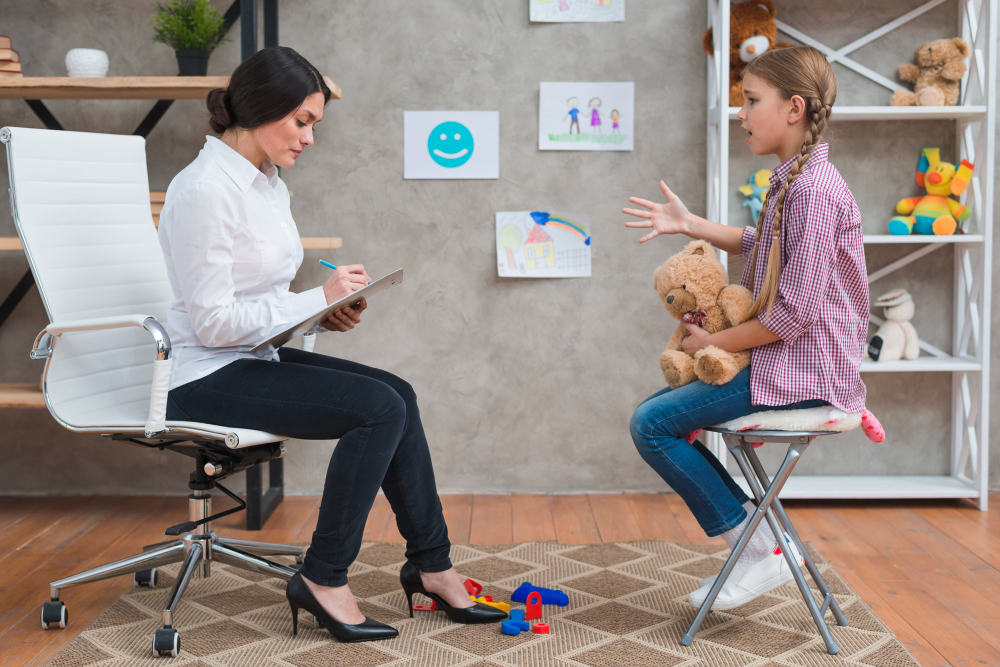Mental health is just as essential as physical health, and counseling and psychotherapy may help people deal with concerns like anxiety, despair, and stress. People of various ages, including children and teenagers, might be affected by these concerns. According to research, one in every five children and adolescents has a mental health issue, making it critical to address their needs and give them the appropriate assistance.
Psychotherapies for Children and Adolescents: What Are They?
Psychotherapies of many forms can be used to assist children and adolescents with mental health difficulties. Cognitive-behavioral therapy, interpersonal therapy, and family therapy are some of the most prevalent. Cognitive-behavioral therapy assists people in identifying and replacing negative ideas and actions with good ones. Interpersonal therapy focuses on the individual’s relationship with their family or friends, whereas family therapy incorporates the entire family in the counseling process.

Psychotherapy Has Several Advantages for Children and Adolescents
Psychotherapy can offer several advantages to children and adolescents suffering from mental illnesses. It can assist children in developing coping skills, increasing their self-esteem, and managing their emotions. It can also help children enhance their connections with family and friends, as well as their academic performance. Furthermore, by addressing mental health concerns early on, psychotherapy can help avoid future mental health difficulties.
Selecting the Best Therapist for Your Child or Adolescent
When looking for a therapist for a kid or teenager, look for someone who has worked with young people and their unique mental health challenges. The therapist should also be someone with whom the kid or teenager feels at ease conversing and developing a relationship. It is also critical to locate a therapist who employs evidence-based treatments who is licenced and trained in psychotherapy.
Child Therapy Methods
Therapists can employ a variety of strategies in child treatment, including play therapy, art therapy, and sand tray therapy. Toys and games are used in play therapy to help children express their emotions and experiences. Sand tray treatment uses sand and small figurines to construct settings that depict the kid’s feelings and experiences, whereas art therapy uses art materials to help the child express themselves.
Adults’ Psychotherapy
Adults, like children and adolescents, can benefit from psychotherapy. Adults can benefit from psychotherapy for a variety of concerns, including anxiety, depression, marital problems, and life changes. Some of the most frequent forms of psychotherapy for adults are cognitive-behavioral therapy, dialectical behavior therapy, and psychodynamic therapy.
Adult Psychotherapy Advantages
Adults can benefit from psychotherapy in a variety of ways. It can help individuals understand themselves, their emotions, and their behaviors better. It can also assist individuals in recognising and changing bad habits in their life. Adults can also benefit from psychotherapy by improving their communication and interpersonal skills, reducing stress and anxiety, and increasing their general feeling of well-being.
Selecting the Best Adult Therapist
It is just as crucial to choose the correct therapist for adults as it is for children and adolescents. The therapist should be someone with whom the adult feels at ease conversing and developing a relationship. It is also critical to locate a therapist who employs evidence-based treatments who is licensed and trained in psychotherapy.
Various Adult Psychotherapy Approaches
Adults can benefit from a wide range of psychotherapy treatments. Cognitive-behavioral therapy, for example, focuses on recognising and modifying negative thought patterns, whereas dialectical behavior therapy focuses on creating skills for dealing with powerful emotions. Psychodynamic treatment is delving into one’s unconscious ideas and past experiences in order to acquire insight into one’s current behavior and feelings.
Psychotherapy with an Integrated Approach
Integrative psychotherapy is a method of combining several therapeutic modalities to better meet the requirements of the person. This approach acknowledges that no single treatment strategy works for everyone and that different people may require various approaches depending on their specific experiences and personality factors.
Integrative psychotherapy may include treatments such as cognitive-behavioral therapy, psychodynamic therapy, humanistic therapy, and others. Using an integrated approach, therapists may adjust their therapy to their clients’ individual requirements, resulting in a more personalised and successful treatment.

Group Counseling
Another type of psychotherapy that may be very useful for people of all ages is group therapy. Group therapy is gathering a small group of people who are coping with similar concerns, such as depression or anxiety. A skilled therapist leads the group, guiding participants through conversations and exercises that might help them manage their concerns.
Group therapy may give a sense of community and support, as well as better social skills and the opportunity to learn from others who are coping with similar challenges. Group therapy is also less expensive than individual treatment, making it a more accessible choice for many people.
Conclusion: For children and adolescents with mental health difficulties, counseling and psychotherapy may be quite beneficial. There are numerous types of psychotherapies accessible, and it is critical to select the correct therapist who can give evidence-based techniques while also developing a connection with the child or teenager. Therapy can help children and adolescents acquire the coping skills they need to manage their mental health challenges and enhance their overall well-being.

